What food should I eat when pregnant and for to lose weight | by Mark Hyman. Food what the heck should i eat so much and food what the heck should i eat everyday. What you eat during pregnancy is important for your health, as well as the health of your baby. High protein diets can also reduce obsessive thoughts about food by 60%, reduce desire for late-night snacking by half, and make you so full that you automatically eat 441 fewer calories per day.
Dr. Mark Hyman sorts through the conflicting research on food to give us the skinny on what to eat.
Did you know that eating oatmeal actually isn't a healthy way to start the day? That milk doesn't build bones, and eggs aren't the devil?
Even the most health conscious among us have a hard time figuring out what to eat in order to lose weight, stay fit, and improve our health. And who can blame us? When it comes to diet, there's so much changing and conflicting information flying around that it's impossible to know where to look for sound advice. And decades of misguided "common sense," food-industry lobbying, bad science, and corrupt food polices and guidelines have only deepened our crisis of nutritional confusion, leaving us overwhelmed and anxious when we head to the grocery store.
Thankfully, bestselling author Dr. Mark Hyman is here to set the record straight. In Food: What the Heck Should I Eat? -- his most comprehensive book yet -- he takes a close look at every food group and explains what we've gotten wrong, revealing which foods nurture our health and which pose a threat. From grains to legumes, meat to dairy, fats to artificial sweeteners, and beyond, Dr. Hyman debunks misconceptions and breaks down the fascinating science in his signature accessible style. He also explains food's role as powerful medicine capable of reversing chronic disease and shows how our food system and policies impact the environment, the economy, social justice, and personal health, painting a holistic picture of growing, cooking, and eating food in ways that nourish our bodies and the earth while creating a healthy society.
With myth-busting insights, easy-to-understand science, and delicious, wholesome recipes, Food: What the Heck Should I Eat? is a no-nonsense guide to achieving optimal weight and lifelong health.
What the Heck Should I Eat?
Eating meat will clog your arteries, cause cancer and type 2 diabetes, and take years off your life, right?
No, but you could be excused for believing that. A lot of people do, meat lovers and abstainers alike.
This food, that as a species we have eaten since the beginning of our evolution, has become the most controversial thing on our plates. It’s where many of today’s raging food fights—warring nutritional theories, the abysmal state of our nation’s health, the environmental impact of agriculture, the unethical treatment of animals—all come together in one big, messy collision.
Is meat really bad for us, or really good for us? If we want to live long, healthy lives, should we eat a lot of it, a little, or none at all?
Those are among the questions I tackle in my new book
While anti-meat advocates and scientists have tried to scare Americans by linking meat to everything from cancer to heart disease, diabetes, and even obesity, research actually shows meat is a nutrient-dense food that can help prevent disease and nutritional deficiencies when you eat it with plenty of plants and vegetables and not as part of the typical Western diet and lifestyle.
That doesn’t mean there isn’t a dark side to eating meat (which I explore in my book). But there are good scientific and health-minded reasons to eat high-quality, organic, grass-fed, sustainably raised meat as part of an overall healthy diet.
Here are 7 takeaways I explore in the chapter about meat in Food: What the Heck Should I Eat? to help you make the most informed decision about eating this sometimes-controversial food.
1. Meat is the single best source of protein.
Sorry, vegans and vegetarians: You may have heard that legumes have a lot of protein, and they do—for plants. But they lack a number of critical amino acids. Fulfilling your protein requirements (60 – 90 grams or more for adults) with non-meat foods requires enormous planning and effort, more than most people can manage. You have to eat three cups of beans with 100 grams of carbs to equal 6 ounces of animal protein (that contains zero carbs). And plant proteins contain very little leucine, the rate limiting amino acid needed to build muscle. Animal protein is the best source and is especially important as we get older, where muscle loss is the single biggest cause of rapid aging and disease.
2. Meat was (and still is) unfairly demonized.
The discovery a half a century ago that saturated fat raises cholesterol levels led to the widespread demonization of meat. We cut back on meat, we chose “lean” meat, and we trimmed and skimmed all the fat off our meat. In reality, heart disease is a complex condition that involves not only blood levels of the bad types of cholesterol, but inflammation, blood sugar, triglycerides, and a host of other factors. And the impact of saturated fat on cholesterol is not so simple either. In fact, the main source of saturated fat in meat, stearic acid, has no impact on blood cholesterol. Even more surprising is that eating saturated fat doesn’t raise blood levels of the saturated fats that cause heart disease. It’s processed carbs, refined starch, and sugar that actually raise your blood levels of bad cholesterol and the bad saturated fats. In Food: What the Heck Should I Eat?, I discuss what does cause heart disease and so many other problems like diabesity.
3. We’re still debating how much saturated fat is “healthy.”
Despite organizations like the American Heart Association demonizing it, the latest wisdom suggests that saturated fat is fairly neutral. It’s not harmful, but it’s not necessarily a health food. The one major randomized controlled trial done in the 1960s and 70s (which would be unethical now because it was done on 9,000 patients hospitalized in mental institutions and was suppressed for 40 years) found that the half of the group that had corn oil lowered their cholesterol but had more heart attacks and deaths than the saturated fat group. Pretty much the nail in the coffin of the saturated fat is bad theory. I’ll explain more in Food: What the Heck Should I Eat?
4. Meat is a nutritional powerhouse.
Animal protein is our only source of vitamin B12, which is essential for life itself. Meat also provides valuable minerals and other vitamins. It contains enzymes that we need to access nutrients, essential amino acids, and cancer-fighting antioxidants like vitamin A, which cannot be obtained directly from vegetables. Vegans often become deficient in B12, iron, zinc, vitamin A, vitamin D and more. Yes, plant foods contain many of these nutrients, but they are more bioavailable in meat.
5. Grass-fed is better.
Three decades of research prove grass-fed beef and pasture-raised meat are significantly healthier than grain-fed, factory-farmed meat. Grass-fed meat has much better types of fat than grain-fed—more omega-3s, fewer omega-6s, and more CLA, or conjugated linoleic acid, which boosts metabolism and can prevent cancer. Grass-fed meat also has higher levels of vitamins, minerals, and other nutrients. Yes, it is often more expensive. In Food: What the Heck Should I Eat? I’ll provide strategies to eat grass-fed meat on a budget and alternatives to look for if you can’t find grass-fed.
6. Most of your plate should still be plants.
At least three-quarters of your plate should be vegetables and the rest protein. I like the term “condi-meat”—a small amount of meat added to meals that are mostly vegetables. I’ve downsized my own consumption to no more than 4 – 6 ounces a day, which is a piece that’s roughly the size of my palm.
7. You can be a sickly, overweight vegan or a healthy, well-nourished carnivore.
What about all the well-publicized scientific studies showing that meat eaters are in worse health than vegetarians and die sooner? Well, the findings may have something to do with which meat eaters are being studied. Studies show many people who eat a lot of meat also have unhealthy habits overall: They weigh more, drink more, smoke more, eat less produce and fiber, and are more sedentary than those who consume less meat. So maybe it isn’t the meat that’s damaging carnivores’ health—maybe it’s everything else they are doing to damage their health. In fact, vegetarians and meat eaters who shop at health food stores both have their risks of death and disease reduced in half. It’s not the meat, it’s what is contained in the rest of your diet.
In my book Food: What the Heck Should I Eat? (out February 27, 2018) I uncover the truth about the food we actually eat—what is healthy and not in each group of foods we eat—meat, poultry and eggs, dairy, beans, grains, veggies, fruit, nuts and seeds, beverages and more, and guide to you to a science-based, sensible way of eating for life that keeps you, our planet, and our society healthy. I also address the environmental and social impact of the food we eat.
And I take the guesswork out of how to eat food that has the best information, the best quality to make you feel good now and prevent and even reverse illness.
If you have ever woken up wondering what the heck you should eat this book is for you.
Mark Hyman MD is the Director of Cleveland Clinic’s Center for Functional Medicine, the Founder of The UltraWellness Center, and a ten-time #1 New York Times Bestselling author.
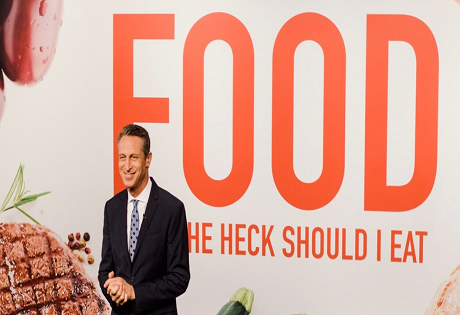
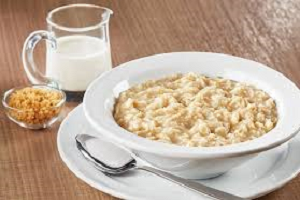
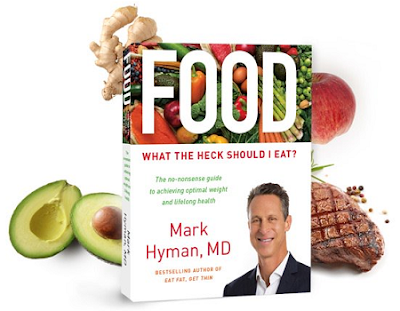
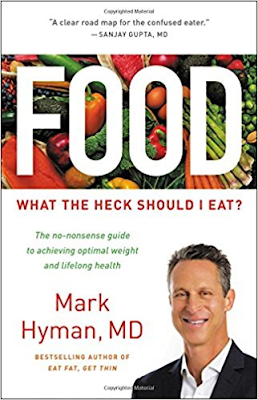
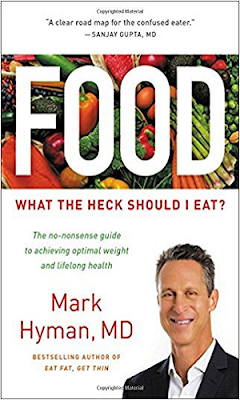
Add Your Comments